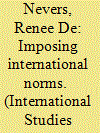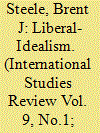| Srl | Item |
| 1 |
ID:
077677


|
|
|
|
|
| Publication |
2007.
|
| Summary/Abstract |
What role does force play in changing international norms and who is it used against? This essay argues that when great powers seek to promote new norms, they will coerce the weak; persuasion is saved for the strong. The interaction of two factors-the standing of the target state in the international society of states and its power relative to the norm-promoting great power-helps explain the use, or nonuse, of force by great powers seeking to promote norms. The cases of the slave trade, piracy, and state sponsorship of terrorism are examined to evaluate how the attributes of norm-violating states affect the likelihood that great powers will intervene to encourage states to adopt new norms. Power appears to be the best defense against being targeted by a great power seeking to promote norm change, but good standing in the international society of states is an important deterrent against intervention
|
|
|
|
|
|
|
|
|
|
|
|
|
|
|
|
| 2 |
ID:
077676


|
|
|
|
|
| Publication |
2007.
|
| Summary/Abstract |
Recently, scholars have connected US constructivism to liberal-idealism. International relations theorists have branded US constructivists as "liberal theorists" for three notable reasons: (1) realists apply an "idealist" tag on constructivism so that it can efficiently be dismissed as a form of theoretical naïvete, (2) rational choice empiricists are motivated with amending constructivist assumptions to make them viable for quantitative analysis; and (3) certain constructivist scholars have attempted to build bridges with rationalist scholarship, especially on epistemological terms, and this "bridge-building" has opened a door for a liberal-constructivist synergy. This essay demonstrates how constructivism can, and must, be distinguished from liberalism. It uses the recent Iraq War to illustrate three constructivist critiques of an important liberal theory: democratic peace "theory." The three critiques are (1) ontological-liberal democratic peace researchers' focus on events leads to an incomplete understanding of processes, structures, and agency; (2) epistemological-unlike constructivism, liberal democratic peace research fails to acknowledge the contamination of subject and object or that state agents use theory to inform their actions; thus the traditionally positivist emphasis on outcomes instead of processes makes for faulty conclusions; and (3) normative-liberalism's radical celebration of the individual desocializes states thereby inhibiting, in structurationist terms, the reflexive monitoring of actions. The essay concludes with some general theoretical statements about democratic peace's future as a paradigm for research.
|
|
|
|
|
|
|
|
|
|
|
|
|
|
|
|
| 3 |
ID:
077675


|
|
|
|
|
| Publication |
2007.
|
| Summary/Abstract |
International institutions are a central focus of international relations scholarship as well as of policymaking efforts around the world. Despite their importance, our scholarly literature lacks a widely accepted definition of just what they are. Instead, scholars have employed a range of largely nonoverlapping conceptions, contributing to a fragmentation of the literature and hindering theoretical cumulation. This essay seeks to remedy this unsatisfactory state of affairs. It first reviews the principal ways in which international institutions have been conceptualized and identifies their shortcomings. It then develops a definition that promises to be inclusive of what are commonly regarded as the most important institutional forms without losing analytical coherence. A final section discusses some of the concrete benefits that result from employing the new definition, both in improving existing scholarship and by suggesting valuable new avenues of research
|
|
|
|
|
|
|
|
|
|
|
|
|
|
|
|